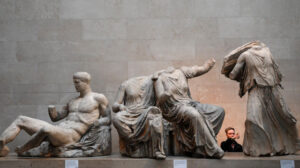In an opinion piece regarding the return of the Parthenon Marbles to Greece, a British intellectual argues that these antiquities should remain permanently in the British Museum, mainly because today’s humanity is entirely incapable of appreciating the true value of these unparalleled works of art.
The unworthy, according to columnist A.N. Wilson, include not only contemporary Greeks—whom he evidently holds in contempt, avoiding even a mention of the Prime Minister of the Hellenic Republic—but also the chairman of the British Museum, George Osborne, whom he bluntly describes as incompetent and unsuitable. Alongside them, he targets nearly every tourist who reduces the masterpieces of the Parthenon to mere backdrops for their selfie poses.
Although contradictory in some respects, Wilson’s article is highly interesting as a reflection of the perceptions prevailing in British society today regarding the Parthenon Marbles.
Wilson does not shy away from scathing remarks. For example, he writes, “More people will see the Parthenon Marbles if they remain in London than if they are transferred to Greece.” Even more sharply, he adds, “Would you ever trust either the director of the British Museum or the Greek Prime Minister to reach a reasonable conclusion?”

Andrew Norman Wilson is a prolific author, respected and considered influential—at least within Britain. He writes regularly for The Times of London and, in this case, voices his opposition to any scenario involving the return of the Parthenon Marbles to Greece.
Nevertheless, his article exalts ancient Greek civilization, its enduring legacy, and the unworthiness of modern people—everyone without exception, including the chairman of the British Museum—to even understand the true message of democracy and wisdom emanating from the Parthenon Marbles.
The article, titled “We Lost Our Marbles Over Ancient Greece” in the esteemed British Times, is subtitled: “The British Museum is not a site of cultural theft but a tribute to a superior civilization that we no longer comprehend.”
The magnetic headline “We Lost Our Marbles Over Ancient Greece” could be rendered as “Ancient Greece Has Driven Us Crazy” and relies on an untranslatable pun. The power and uniqueness of the phrase lie in the double meaning of the word “marbles.”
In British slang, the idiom “we lost our marbles” means “we’ve gone mad” or “lost our sanity.” Yet “marbles” also refers—by metonymy—to ancient sculptures, particularly the Parthenon sculptures, previously known as the “Elgin Marbles.” Thus, A.N. Wilson slyly mocks the ongoing debate about the Marbles’ return to Greece as exaggerated and meaningless.
Wilson’s argument against the return of the ancient Greek sculptures unfolds as follows:
“The Prime Minister [i.e., the UK’s Sir Keir Starmer] asserts that he will not engage in discussions about the future of the Parthenon Marbles. The British Museum is to handle the matter with the Greeks. This means that the issue will be left to the chairman of the British Museum, George Osborne, and the Greek Prime Minister. Would you ever trust either the director of the British Museum or the Greek Prime Minister to reach a reasonable conclusion?
At present, it does not seem the best time to open the controversial question of whether the Parthenon Marbles should be returned to Athens or remain in London, where more people will see them than if they were moved to Greece.
By an act of our Parliament, the British Museum is forbidden from disposing of any of its exhibits. On their part, the Greeks have made it clear for decades that they will not accept a ‘loan’ of the Marbles, as they do not consider them the property of the British Museum.
Even how one refers to the Marbles reveals a particular bias: Calling them ‘the Parthenon Sculptures’ places one among those who believe the Marbles should reside where they first stood tall in the mid-5th century BC. Referring to them as the ‘Elgin Marbles’ aligns one with the view that they belong to the British Museum, housed in its magnificent Greek Revival building in Bloomsbury—designed specifically for the Marbles by Robert Smirke in all its Hellenic glory to accommodate these treasures.
Lord Byron ridiculed British Hellenists like Lord Aberdeen and Elgin for [in verse], ‘turning their grand salons into bazaars with all their goods / to display their mutilated sculptures.’ Byron was repelled by Elgin and the others ‘departing from Greece with three or four ships laden with the most precious and voluminous remnants that time and barbarism had left untouched in the most wounded and glorified city of the world… I cannot think of any motive that could justify this brazen destruction.’
Byron wrote this 15 years before his death—indeed, from an infection. Even so, he went to Missolonghi to fight against the Turks for Greek Independence, prepared to give his life if necessary.
Goethe—no one could deny his appreciation of Byron’s value—viewed Byron’s death under such circumstances as a martyrdom for Greece. Yet, like many others in Western Europe, Goethe expressed gratitude that Elgin had taken the Marbles, allowing replicas to be made in large quantities and enabling many to see how splendid these works were.
The world has moved on from the days of Byron and Elgin. The very idea of a museum where one European country displays the artistic works of another culture has become suspect. It would be unthinkable in today’s ideological climate for an archaeologist to remove valuable artifacts from another part of the world. If you excavate and find something in Greece, India, or Botswana, that’s where it should stay.
And yet, rather than viewing the Greek Revival building in London that houses the Parthenon Marbles as a ‘site of theft,’ it is equally valid to see it as a tribute to Greece. It acknowledges that all the centuries since Pericles, Phidias, and that tiny city-state that gave us the greatest tragedies ever staged, the finest philosophers, the most wondrous statues, and the most powerful political idea—democracy—have been a disappointment in comparison.
Phidias was criticized in his time for making his sculptures too naturalistic. He depicted even gods as ordinary people. But the human element in his artistry places humanity at the center—not only of our perception of art but of every attempt to make politics fairer and more humane.
‘The owl of Athena spreads its wings only with the coming of dusk,’ Hegel once said, meaning that philosophy understands historical events only after they are complete when night begins to fall.
Should George Osborne [the chairman of the British Museum], a businessman who has failed in all his previous endeavors, decide the fate of a frieze long after Athena’s owl has taken flight and darkness has descended?
I do not mean we’ve merely forgotten ancient Greek studies (although this is true in Britain; only a few hundred students across the country choose Greek in their final school years). We’ve lost touch not only with the Greek language but also with the heritage created by the Athenians at their peak.
The Parthenon was largely built based on designs by Phidias, the close friend of Pericles’ father, who founded Athenian democracy. Pericles’ Funeral Oration at the end of the first year of the Peloponnesian War against Sparta rightly echoes through the ages. It is not just a defense of democratic ideals but also celebrates the idea of tolerance: ‘We are free and tolerant in our private lives, but in public affairs, we respect the law. This is because the law commands our utmost respect.’
Plato mocked Pericles’ democratic ideals. Yet Plato’s lifelong work, dedicated to the memory of his hero Socrates, pays homage to the intellectual freedoms that are now under severe threat—even in British universities. Socrates was sentenced to death in 399 BC for daring to question accepted truths, but Plato’s dialogues kept alive the idea that a civilized life—and especially wisdom—depends on our ability to question and challenge. This intertwined with a profound metaphysical belief that the forms and concepts of the external world are mere replicas of a celestial reality.
Byron and Elgin would probably both be snobbish enough to avoid asking—were they to return to the British Museum today—how many of the tens of thousands of tourists taking selfies in front of the Marbles are capable of reading their message. Blinded by woke culture and consumerism, can we see what Phidias and Plato saw? The 19th-century Hellenists were not blasphemous toward the glory of ancient Greece—not even remotely to the extent we are today. Whether we leave the Marbles in London or send them to Athens to become yet another tourist attraction.”
Ask me anything
Explore related questions





